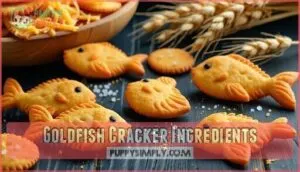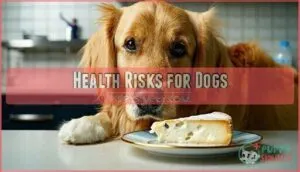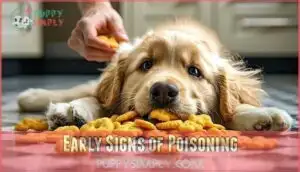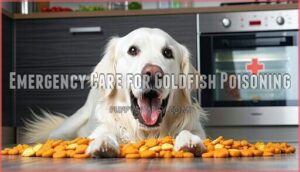This site is supported by our readers. We may earn a commission, at no cost to you, if you purchase through links.

While one or two won’t cause immediate harm, these cheesy snacks pack too much salt and contain ingredients that can hurt your furry friend.
The high sodium content can lead to dehydration, and some varieties include onion powder, which is toxic to dogs.
Regular consumption might cause obesity, diabetes, or pancreatitis.
Think of goldfish crackers like junk food for humans – fine occasionally but not healthy as a habit.
Your pup’s digestive system isn’t built for processed snacks loaded with artificial flavors and preservatives.
Better alternatives exist that’ll keep your dog’s tail wagging safely.
Table Of Contents
- Key Takeaways
- Dog Goldfish Cracker Risks
- Can Dogs Eat Goldfish Crackers
- Goldfish Cracker Ingredients
- Health Risks for Dogs
- Symptoms of Goldfish Poisoning
- Safe Feeding Guidelines
- Dog Safe Snack Alternatives
- Goldfish Cracker Dangers
- Preventing Goldfish Cracker Consumption
- Emergency Care for Goldfish Poisoning
- Frequently Asked Questions (FAQs)
- Can dogs eat Goldfish crackers?
- Can dogs eat goldfish?
- Can Great Danes eat Goldfish crackers?
- Can dogs have Flavor Blasted Goldfish?
- Can dogs eat crackers?
- Do Goldfish crackers need to be cooked?
- How many goldfish crackers can a dog eat?
- What crackers are ok for dogs?
- Are goldfish crackers safe?
- Can cats eat goldfish crackers?
- Conclusion
Key Takeaways
- You shouldn’t give your dog goldfish crackers regularly because they contain toxic onion powder and garlic that can cause anemia by destroying red blood cells, plus excessive sodium that leads to dehydration and kidney problems.
- You’ll notice poisoning symptoms within 6-12 hours including pale gums, vomiting, lethargy, and difficulty breathing – if you see these signs, contact your vet immediately for emergency treatment.
- You’re putting your dog at risk for long-term health issues like obesity, diabetes, and pancreatitis when you feed them these processed snacks that contain artificial flavors, preservatives, and ingredients their digestive system can’t handle properly.
- You can choose safer alternatives like plain cooked chicken, carrots, apples, sweet potatoes, or homemade treats made with dog-safe ingredients that provide nutrition without the dangerous additives found in goldfish crackers.
Dog Goldfish Cracker Risks
You’ll discover that goldfish crackers contain several ingredients that can harm your dog’s health.
These popular snacks include onion powder, garlic salt, and high sodium levels that pose serious risks to your pet’s wellbeing.
Toxic Ingredients in Goldfish
Your dog’s safety depends on recognizing toxic ingredients lurking in those cheesy crackers.
Goldfish crackers contain several harmful spices that pose serious dog health risks.
Here are the main toxic ingredients to watch for:
- Onion powder – causes red blood cell damage and anemia
- Garlic powder – triggers garlic poisoning even in small amounts
- Dehydrated onion – concentrated toxicity that’s worse than fresh
- Artificial seasonings – contain multiple harmful spices dogs can’t process
These ingredients make goldfish crackers dogs should never eat regularly.
Sodium Content in Goldfish
Goldfish crackers pack 250 mg of sodium per serving, which exceeds your dog’s recommended daily intake of 200 mg.
This high sodium content creates serious dehydration risks and can spike blood pressure dangerously.
Sodium toxicity threatens kidney function and overall dog health.
Even small amounts of these toxic foods for dogs can disrupt proper dog nutrition and cause lasting harm.
Onion and Garlic Poisoning
Even tiny amounts of onion and garlic can spell trouble for your furry friend.
Even a single goldfish cracker can pose serious health risks to your beloved dog.
These toxic foods for dogs cause serious anemia risks by destroying red blood cells.
The toxic dose is surprisingly low – just 15-30 grams per kilogram of body weight.
Garlic effects appear within hours, while onion toxicity builds up over time.
Dog poisoning symptoms include weakness and pale gums, requiring immediate veterinary intervention to prevent life-threatening complications, which can be a result of serious anemia risks.
Can Dogs Eat Goldfish Crackers
While many pet parents wonder if sharing snacks is okay, the short answer about goldfish crackers isn’t what you’d hope.
These cheesy treats aren’t dogsafe due to harmful ingredients that can trigger dog poisoning symptoms. Are goldfish safe for dogs? Not really – even safe cracker brands contain too much sodium for your pup’s health.
Here’s what you need to know:
- Nutritional comparison shows crackers lack benefits for dogs
- Long-term effects include obesity and digestive issues
- Treat size matters – even small amounts pose risks
- Recipe modifications can’t make store-bought versions safe enough
Goldfish Cracker Ingredients
Understanding what’s inside those orange crackers helps you make safer choices for your dog.
Goldfish crackers contain enriched wheat flour, cheddar cheese, vegetable oils, salt, and onion powder that can affect your pet’s health, making it crucial to be aware of these ingredients for your dog’s safety.
Enriched Wheat Flour
Looking at goldfish crackers’ main ingredient, enriched wheat flour provides essential vitamins and minerals through wheat processing.
While flour nutrients like niacin and folic acid aren’t toxic, gluten content can trigger sensitivities in some dogs.
Canine digestion struggles with processed grains compared to alternative flours like oat or rice. These dogsafe ingredients exist, but goldfish crackers use nondogsafe formulations.
Cheddar Cheese Content
Real cheddar cheese in goldfish crackers brings both benefits and concerns for your dog.
While it provides calcium and protein, the fat content can trigger digestive upset.
Dogs with lactose concerns may experience bloating or diarrhea.
Cheese allergies aren’t uncommon either, and the sodium levels combined with cheddar nutrition create potential dog food hazards worth considering, especially due to the fat content.
Vegetable Oils Used
Goldfish crackers typically contain a blend of vegetable oils that can impact your dog’s digestion.
These processing methods create fats that aren’t necessarily toxic but can cause stomach upset in sensitive pups.
Here are the main oil types found in these crackers:
- Canola oil – commonly used for texture
- Sunflower oil – adds moisture and flavor
- Soybean oil – cost-effective processing choice
- Combination blends – mixed for stability
- Genetically engineered sources – often unmarked ingredients
While these vegetable oils won’t poison your furry friend, they’re not ideal for dog digestion either.
Salt and Onion Powder
Beyond the oils, two ingredients in goldfish crackers pose serious threats to your dog’s health.
Salt contributes to the sodium content that can trigger salt poisoning and dehydration risks in canines.
Onion powder, even in small amounts, causes onion poisoning that damages red blood cells.
These toxic ingredients make goldfish crackers dangerous despite safe amounts seeming harmless.
Always seek veterinary advice.
Health Risks for Dogs
Goldfish crackers pose several serious health risks that can harm your dog’s well-being.
These snacks contain toxic ingredients and high sodium levels that can lead to anemia, dehydration, obesity, and dangerous digestive problems.
Anemia and Dehydration
When dogs eat goldfish crackers, the onion and garlic powder damage red blood cells, while high sodium levels trigger dangerous fluid loss.
Your pet’s body can’t handle these attacks on multiple fronts.
Watch for these warning signs:
- Pale gums indicating damaged red blood cells
- Excessive panting from breathing issues
- Lethargy as anemia sets in
- Increased thirst from dehydration
Both conditions develop within days of consumption, leading to dangerous fluid loss.
Obesity and Diabetes
Those extra pounds from goldfish crackers pack more punch than you’d think.
High carbs spike your dog’s blood sugar, creating insulin resistance over time.
Weight management becomes harder when processed snacks replace proper nutrition. Regular consumption affects long-term effects on your pup’s metabolism.
| Health Risk | Short-Term Impact | Long-Term Consequence | Prevention Method | Warning Signs |
|---|---|---|---|---|
| Insulin Resistance | Blood sugar spikes | Type 2 diabetes | Controlled dog diet | Excessive thirst |
| Weight Gain | Reduced energy | Obesity complications | Exercise benefits | Difficulty moving |
| Poor Nutrition | Digestive upset | Malnutrition | Balanced meals | Coat changes |
| Metabolic Issues | Lethargy | Organ damage | Portion control | Breathing problems |
| Dietary Impact | Appetite loss | Dog health concerns | Vet consultation | Behavioral changes |
Pancreatitis and Gastrointestinal Issues
High-fat content in goldfish crackers can trigger pancreatitis in your dog.
Processed carbs cause insulin spikes, while excess dietary fat strains the pancreas.
Watch for abdominal pain, fever, and vomiting – classic pancreatitis symptoms.
These crackers also cause digestive upset through their sodium content, disrupting normal dog digestion.
Your pup’s stomach wasn’t designed for human snacks, which can lead to digestive upset.
Symptoms of Goldfish Poisoning
You’ll need to watch for specific warning signs if your dog has eaten goldfish crackers containing toxic ingredients like onion or garlic powder.
These symptoms can appear within 6-12 hours and range from mild stomach upset to serious poisoning that requires immediate vet care.
Early Signs of Poisoning
After your dog accidentally munches on goldfish crackers, watch for these toxic poisoning symptoms that signal trouble’s brewing:
- Gum Color changes from pink to pale or white
- Eye/Nose Pallor indicating circulation problems
- Initial Lethargy and unusual tiredness
- Vomiting Onset within 6-12 hours
- Breathing Difficulty or rapid panting
These emergency signs mean it’s time to call your vet immediately.
Severe Reaction Symptoms
When symptoms escalate beyond mild discomfort, you’re facing a veterinary emergency.
Severe poisoning symptoms demand immediate vet intervention. Watch for breathing difficulties, pale gums, and jaundice signs – these indicate toxic reactions affecting your dog’s essential organs.
| Critical Symptoms | What It Means |
|---|---|
| Breathing difficulties | Respiratory distress from toxins |
| Pale gums/jaundice | Blood cell damage, liver stress |
| Seizures/tremors | Neurological system failure |
Dehydration risks compound these dangers, making emergency care essential.
Lethargy and Vomiting
When your dog seems unusually tired after eating goldfish crackers, don’t brush it off as normal sleepiness. These Delayed Symptoms often signal toxic poisoning that requires immediate attention from your vet.
When your dog seems unusually tired after munching goldfish crackers, that’s not just sleepiness – it’s a red flag demanding immediate vet attention.
- Persistent vomiting lasting over 2 hours needs emergency vet evaluation
- Lethargy continuing beyond 12 hours indicates potential organ damage from poisoning
- Combined vomiting and diarrhea creates dangerous dehydration requiring fluid therapy
- Projectile vomiting may mean gastrointestinal blockage from cracker pieces
- Lethargy with fever suggests serious infection needing dog poisoning treatment
Horseradish ingestion could lead to gastrointestinal tract inflammation. Breed Susceptibility varies substantially – smaller dogs face higher risks than larger breeds.
Treatment Options depend on Severity Factors like amount consumed and your dog’s size. Recovery Timeline extends from days to weeks depending on intervention speed.
Safe Feeding Guidelines
You should always talk to your vet before giving your dog goldfish crackers to avoid health risks.
Even one or two crackers won’t usually harm most dogs, but small dogs and puppies face higher risks from the salt and onion powder in these snacks.
Consult a Veterinarian
Before making any decisions about goldfish crackers for your dog, professional veterinarian advice is your best friend.
Your vet understands your dog’s specific health needs, breed predispositions, and can provide proper dosage concerns guidance. They’ll establish emergency protocols and symptom monitoring plans customized to your pet’s unique situation.
A balanced diet can include essential organ meats to provide necessary vitamins.
| Vet Consultation Benefits | What to Discuss | When to Call |
|---|---|---|
| Personalized health assessment | Your dog’s current diet | Before first feeding |
| Breed-specific risk evaluation | Any existing allergies | After accidental ingestion |
| Emergency protocol establishment | Symptom monitoring plan | If symptoms appear |
Occasional Ingestion Risks
Small Amount Harm rarely occurs when your dog snatches one or two goldfish crackers.
However, Cracker Count Matters substantially. Breed Vulnerability increases risks for smaller dogs, while Puppy Sensitivity and Senior Dog Concerns make younger and older pets more susceptible to sodium and onion toxicity.
Monitor closely, but don’t panic over accidental ingestion of dog safe foods alternatives.
Homemade Alternative Treats
Skip the store-bought snacks and create DIY dog treats that’ll make your pup’s tail wag.
Homemade alternatives offer complete control over ingredients while delivering serious cost savings compared to commercial options. You can find resources for chewy homemade recipes online.
- Carrot and oats treats – Mix shredded carrots with rolled oats for crunchy, healthy dog snacks
- Sweet potato chews – Slice and bake until crispy for natural baking alternatives
- Pumpkin rice crackers – Combine cooked pumpkin with rice flour for safe ingredients
- Banana oat biscuits – Mash bananas with oats for soft, digestible homemade dog treats
Dog Safe Snack Alternatives
You don’t need to risk your dog’s health with goldfish crackers when plenty of safe snack options exist.
Fresh fruits like apples and bananas, cooked vegetables such as carrots and green beans, and lean proteins like plain chicken offer better nutrition without the dangerous ingredients found in processed crackers.
Fruits and Vegetables
Instead of risky goldfish crackers, offer your dog safe fruits like apples, bananas, and blueberries. These nutritious treats provide vitamins without harmful ingredients.
Always remove seeds and cores before serving. Safe vegetables include carrots, green beans, and sweet potatoes.
Avoid toxic options like grapes, onions, and garlic. Proper preparation methods guarantee maximum nutritional benefits for your furry friend, ensuring they receive the best nutritional benefits.
Lean Proteins and Whole Grains
When choosing safe alternatives to goldfish crackers, lean proteins like plain cooked chicken or turkey provide essential protein benefits without harmful seasonings.
Whole grains including oats and sweet potatoes support healthy grain digestion while meeting canine dietary needs.
These dog safe snacks form the foundation for a balanced diet and work perfectly in homemade recipes for healthy dog treats.
Healthy Treat Preparation
Making homemade treats gives you complete control over ingredient selection and cooking methods.
Bake simple dog safe snacks using whole wheat flour, plain pumpkin, and unseasoned lean meats. Skip oils, salt, and seasonings entirely.
For additional options, explore various dog treat recipes.
Practice portion control by cutting treats into small pieces. Healthy dog treats that beat store-bought alternatives every time can be created with these safe recipes.
Goldfish Cracker Dangers
Your dog’s favorite orange crackers contain several ingredients that can harm their health.
These snacks pack high sodium levels, onion powder, and garlic that can cause serious poisoning in dogs of all sizes.
Cheese and Lactose Intolerance
The cheese in goldfish crackers can trigger lactose intolerance in many dogs.
Most adult dogs struggle with lactose digestion, leading to bloating, vomiting, and diarrhea.
Some breeds show higher sensitivity to dairy products.
While cheese isn’t toxic, it creates uncomfortable symptoms.
Consider cheese alternatives or safe cheeses in small amounts for dog treats instead.
Salt and Sodium Poisoning
Goldfish crackers pack dangerous sodium levels that can trigger salt overload in your dog’s system.
When dogs eat goldfish crackers regularly, sodium toxicity becomes a real threat, causing severe dehydration and electrolyte imbalance.
Without adequate water access, this toxic buildup strains their kidneys and can lead to permanent kidney damage requiring emergency veterinary intervention.
Onion and Garlic Toxicity
Even tiny amounts of onion and garlic in goldfish crackers can trigger Allium Poisoning in your dog.
These ingredients destroy red blood cells, creating serious Anemia Risk that threatens your pet’s health.
- Toxicity Levels: Garlic is five times more toxic than onion for dogs
- Hidden danger: Both powdered and fresh forms cause poisoning
- Symptoms appear: Within 6-12 hours after eating contaminated treats
- Veterinary Intervention: Required immediately if your dog shows weakness or pale gums
- Safe Alternatives: Choose dog-specific treats without these harmful ingredients
However, unlike onions, bell peppers are safe for canine consumption.
Preventing Goldfish Cracker Consumption
You can protect your dog from goldfish cracker dangers by keeping these snacks stored safely out of reach.
Training your pet to ignore human food and watching their behavior around snacks will prevent accidental poisoning from toxic ingredients like onion powder.
You can also consider toxic ingredients as a key factor in preventing accidental poisoning.
Monitoring Dog Behavior
Watch your dog’s daily habits like a hawk after they’ve eaten goldfish crackers.
Behavioral changes, appetite changes, and unusual activity levels signal trouble. Monitor sleep patterns and hydration signs closely.
If your pup shows lethargy, vomiting, or refuses food, these dog symptoms indicate potential pet poisoning from harmful ingredients.
Remember that toxic ingredients can be harmful to dogs. Contact your vet immediately when concerns arise.
Securing Human Food
Keep goldfish crackers out of reach by storing them in dog-proof containers with secure lids.
Install child safety locks on pantry doors and cabinets where you store snacks.
Place crackers on high counters or shelves to prevent counter surfing.
For added security, consider investing in reliable food storage to deter even the most persistent pets.
Your dog’s nose can detect treats from far away, so proper secure food storage protects against accidental ingestion and potential health risks.
Training Dogs to Avoid Human Snacks
Teaching your dog impulse control through consistent training prevents sneaky snack stealing.
Use positive reinforcement training techniques like the "leave it" command during obedience training sessions.
Reward your pup with safe alternatives when they ignore human food, and behavior modification takes patience, but dog training tips like redirecting attention to approved treats builds better dog behavior habits.
Emergency Care for Goldfish Poisoning
If your dog shows signs of goldfish cracker poisoning like vomiting, pale gums, or difficulty breathing, you need to act fast and contact your vet right away.
Quick emergency care can save your dog’s life since onion and garlic poisoning from these crackers can become serious within hours.
Recognizing Poisoning Symptoms
Spotting trouble after your dog munches goldfish crackers means watching for telltale warning signs.
Onion and garlic toxicity plus sodium overload create serious health risks that demand immediate attention.
Watch for these critical symptoms:
- Anemia signs – Pale gums, weakness, and difficulty breathing indicate red blood cell damage
- Dehydration risks – Excessive thirst, thick saliva, and sunken eyes from sodium poisoning
- Vomiting indicators – Lethargy causes concern alongside diarrhea and stomach upset
Calling a Veterinarian
Contact your vet immediately if you notice severe symptoms like difficulty breathing or pale gums.
Don’t wait for the symptom timeline to worsen – poisoning severity can escalate quickly. Small breeds show greater breed vulnerability, so immediate action matters most.
Ask a vet about emergency protocols and potential veterinary costs beforehand. Professional vet advice beats guessing when your dog’s health hangs in the balance, and it’s crucial to understand the potential veterinary costs and have a clear emergency protocols in place.
Providing Immediate Care
When your dog eats goldfish crackers containing onion or garlic, don’t induce vomiting unless directed by your Emergency Vet.
Monitor hydration closely since sodium causes dehydration quickly. Offer fresh water immediately and watch for lethargy or pale gums.
Call your vet for guidance on activated charcoal or other supportive care measures needed, and follow their advice to ensure the best outcome for your dog, focusing on fresh water.
Frequently Asked Questions (FAQs)
Can dogs eat Goldfish crackers?
Those cheesy little swimmers aren’t exactly dog poison, but they’re not tail-wagging treats either.
You can share one or two occasionally, but skip the onion-flavored varieties completely—they’re genuinely dangerous for your furry friend.
Can dogs eat goldfish?
Real goldfish aren’t safe for your dog to eat.
These live fish can carry parasites and bacteria that’ll make your pup sick.
Stick to dog-approved treats instead of letting them snack on aquarium friends.
Can Great Danes eat Goldfish crackers?
Great Danes shouldn’t eat Goldfish crackers regularly.
While one or two won’t likely harm your gentle giant, these snacks contain onion powder and excess sodium that can cause health issues over time.
Can dogs have Flavor Blasted Goldfish?
Like playing with fire, Flavor Blasted Goldfish pack extra seasonings that spell trouble for your pup.
You shouldn’t share these intensely flavored crackers – they contain higher levels of onion powder and garlic that can poison dogs.
Can dogs eat crackers?
Dogs can eat plain crackers occasionally, but they shouldn’t become a regular treat.
Most crackers contain too much salt and offer little nutritional value.
Skip seasoned varieties completely—they’re potentially harmful to your pup.
Do Goldfish crackers need to be cooked?
These golden treats arrive ready-to-munch straight from the package.
You don’t need to cook Goldfish crackers – they’re already baked and perfectly crispy.
Simply open the bag and enjoy these cheesy snacks as-is.
How many goldfish crackers can a dog eat?
One or two goldfish crackers won’t harm most dogs, but that’s the limit.
Skip making it a habit – the salt and onion powder can cause serious health problems, especially for smaller pups.
What crackers are ok for dogs?
Plain rice cakes, unsalted whole wheat crackers, and homemade oat-based treats work best for dogs.
Skip anything with garlic, onion, excess salt, or artificial flavors.
You’ll keep your pup safer with simple, natural ingredients.
Are goldfish crackers safe?
Think of goldfish crackers as a red flag waving at your pup’s health.
They’re not safe due to toxic onion powder, garlic, and excessive sodium that can cause anemia and dehydration in dogs.
Can cats eat goldfish crackers?
Cats shouldn’t eat goldfish crackers regularly. While a stray cracker won’t poison your feline friend, these snacks contain too much salt and offer zero nutritional value for cats’ dietary needs.
Conclusion
Remember wondering whether can dogs eat goldfish crackers safely? The answer is clear: avoid them entirely.
These processed snacks contain harmful ingredients like onion powder and excessive sodium that can damage your dog’s health.
While one cracker won’t kill your pet, regular consumption leads to serious problems including dehydration, obesity, and pancreatitis.
Choose dog-safe alternatives like carrots, apples, or plain rice cakes instead. Your furry friend deserves treats that support their health, not compromise it.
- https://www.canr.msu.edu/news/keep_our_pets_safe_by_avoiding_these_human_foods
- https://www.merckvetmanual.com/dog-owners/blood-disorders-of-dogs/anemia-in-dogs
- https://vcahospitals.com/know-your-pet/onion-garlic-chive-and-leek-toxicity-in-dogs
- https://pangovet.com/?utm_source=dogster&utm_medium=article&utm_campaign=dog_eat_drink
- https://www.petmd.com/blogs/nutritionnuggets/dr-coates/2014/january/what-foods-taste-good-dogs-31287


















